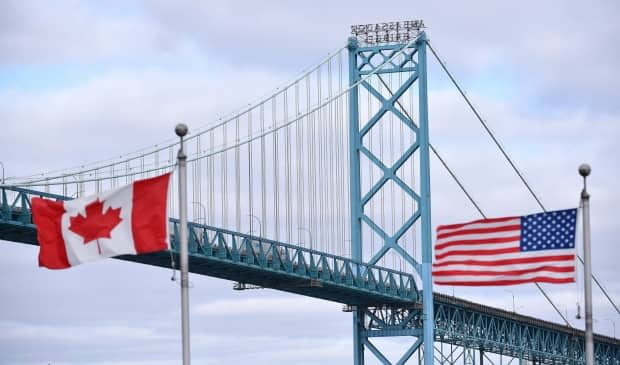Pandemic, mixed messages complicate Canadian students' plans to travel to U.S. for school

Grant Bergeron is preparing to drive his daughter to Chicago for school this fall, but unlike two of his other children who are already studying in the United States, this year's trip to campus may be more complicated due to COVID-19 pandemic restrictions. It doesn't help that border officials in the U.S. are sending mixed messages, parents say.
Bergeron's daughter, Kellene, is starting her first year in the nursing program at Loyola University Chicago, and like other families with children studying in the U.S., he was planning to drive her across the border from Windsor, Ont., to Chicago.
"We've never had to deal with this restrictive nature of the border before," said Bergeron, of Essex, Ont., outside Windsor. "It's really throwing us through a bit of a loop."
Two weeks ago, the federal government announced that fully vaccinated Americans can enter Canada without having to quarantine starting Aug. 9.
A day later, the U.S. government said its side of the land border will remain closed to non-essential travel until at least Aug. 21 to limit the spread of COVID-19.
In a statement to CBC News, a spokesperson with U.S. Customs and Border Protection (CBP) said individuals travelling to the U.S. to attend school, as well as family members assisting the students in their move, will be considered essential.
"Travellers must show valid travel documents," the statement said.
"CBP officers make the final determination of each traveller's admissibility into the U.S. at the port of entry based on the facts and circumstances known to the officers at the time of inspection."
Border crossing rules lead to confusion
Even though school is considered essential, some parents and students in Canada say there is still confusion about the rules regarding who is eligible to cross the border and under what circumstances.
Bergeron said when he phoned the Detroit Field Office, a CBP officer told him that one parent is usually allowed to accompany a student who is moving to the U.S. for the first time.

"I only got that verbally spoken to me by an agent on the phone, which essentially means nothing, because when you present yourself to the booth agent, that person has the deciding ability to deny or permit entry," Bergeron said.
"We aren't comfortable just sending her on her own for the first time and say, 'Good luck, move in on your own.'"
In an interview with CBC News, CBP spokesperson Aaron Bowker said specific guidance for parents isn't available online because determining someone's admissibility into the U.S. is specific to each individual's situation.
"It would be a little too speculative for us to post very specific guidance," he said. "It's a lot easier for the parents to contact the port of entry they're going to cross."
Rachel Alter, 22, is moving from her hometown of Thornhill, Ont., just north of Toronto, to Columbia University in New York City for her first year of teachers college.

She planned to drive with her parents across the border and spoke with a border officer to confirm whether this was permitted. The officer told her that one parent could accompany her across the border, but Alter said there wasn't an explicit policy she could consult to confirm his statement.
"I didn't feel comfortable enough with that information to go ahead and pack everything up and not have a backup," Alter said.
Given the unknowns of land travel, Alter decided it would be best to fly. This meant she'd have to return some of the furniture she purchased in Canada and ask her roommates in the U.S. to pick up furniture for her.
"It's honestly been a really big disaster,"she said. "I personally don't drive, nor would I have access to a car in New York City. Having to return [the furniture] was really frustrating."
Lou Jamernik's son plays hockey for the University of North Dakota.

Before leaving home in Calgary to drive to campus for the first time in December 2020, Jamernik called the Canada-U.S. border and asked an officer if he could accompany his son, Louis, on the trip.
The officer told Jamernik that if his son is 18 years of age or older, he'd have to travel alone, so since Louis is 21, he drove to the U.S. alone.
"There were no issues for him getting through the border [alone]," Jamernik said. "He had his passport, his licence and all school documentation."
Families look for support, answers online
Bowker said age is a factor that border officers consider, but they also recognize there are circumstances in which students may need a parent to accompany them, regardless of their age.
Bergeron's daughter is 18, and he said he worries that when the family gets to the border, he and his wife may be turned away.
"When I spoke to the field office agent, he said typically if the student is under 18, we don't have any issue with allowing a parent to accompany them," Bergeron said.
"So we're still kind of on eggshells, of course, because we don't know."

The 18-year-old daughter of Laura Daniels, who lives in Owen Sound, Ont., will soon start her first year at Fairmont State University in West Virginia.
Last Friday, Daniels and her husband, Peter, managed to drive Olivia across the Peace Bridge in Buffalo, N.Y., to West Virginia. After hearing a couple of weeks ago that the U.S. side of the land border will remain closed to non-essential travel, she began reaching out to other parents on Facebook for advice.
"It wasn't until I talked to some other parents of kids who go to school in the States that they had mentioned it comes down to the border patrol guard," Daniels said.
"Some have said if there's two parents taking a child to school, that they consider that a vacation and not essential travel to get to school."

When determining whether a trip is essential, CPB spokesperson Bowker said border officers will consider the amount of time a family member plans on spending with their child in the U.S. and the number of family members crossing the border.
"It really depends on the circumstances in which it's happening," he said.
"The officers aren't going to understand why four to six family members have to go. That's going to be really hard to substantiate."
With many unknowns in the equation, Bergeron said he has also connected with other families online to find answers.
"We don't know very many other families with children attending U.S. colleges and universities, but Facebook eventually helped," he said.
"We were able to share our frustrations and anxieties about this whole border situation."
WATCH | U.S. land border restrictions to remain in place until at least Aug. 21:
Advice for parents driving to the U.S.
Along with being honest to border patrol officers, Jamernik's biggest advice to Canadian students is to order furniture and other amenities in the U.S. rather than moving items across the border.
"I would tell people to not move stuff as much as possible," he said.
"Another recommendation is to fly into a location in the U.S., meet the student there and then drive up the remainder."
Bergeron and Daniels decided to have backup plans in case they had issues crossing the border.
If only one parent was allowed to drive their daughter to school, Daniels said her husband would get picked up at the border by a relative and then try to find a flight to West Virginia the following day.
For Bergeron, his family's Plan B is to fly to Chicago and then rent a vehicle to drive to the university.
He said the confirmation from border officers that a parent will be able to accompany a child across the border is somewhat reassuring, but he wishes parents had more clarity.
"I think everything's going to be fine if we can just get through customs. And what I would love to have is some kind of assurance in advance."

